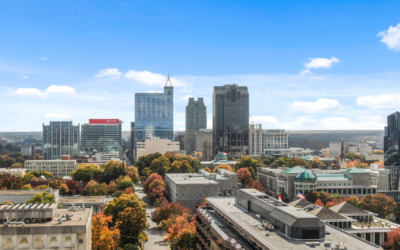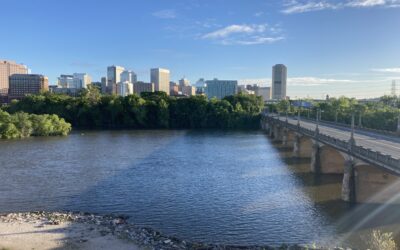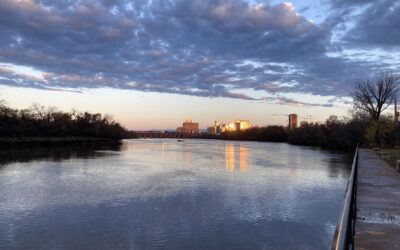Oregon Moving Guide

Is Portland calling to you? From the misty, cool weather to the scenic beauty of its coast, Oregon has a lot to offer. However, there are a few things to keep in mind before making the move. We walk through a few, below:
What should I know about moving to Oregon?
There are a few things to consider when thinking about moving to Oregon:
1. Climate: The climate in Oregon varies greatly depending on where you are in the state. In the western part of the state, you can expect mild winters with rainy weather, while the eastern part of the state is drier and has hot summers and cold winters. Make sure to research weather patterns in the specific area you’re considering.
2. Cost of living: The cost of living in Oregon is slightly higher than the national average, with Portland being one of the most expensive cities to live in. Housing costs, in particular, can be high, but there are more affordable options in smaller towns and rural areas.
3. Outdoor activities: Oregon is known for its natural beauty and outdoor recreation opportunities. From hiking and camping to skiing and snowboarding, there are plenty of ways to enjoy the great outdoors. However, be prepared for rainy weather, which can limit outdoor activities during certain times of the year.
4. Culture and diversity: Oregon is known for its laid-back, friendly culture, but it’s not the most diverse state. If you’re moving from a more diverse area, be prepared for a different cultural experience.
Overall, Oregon can be a great place to live if you’re attracted to its natural beauty and outdoor activities. Just make sure to do your research and consider your budget and lifestyle preferences before making the move.
Why are people moving to Oregon?
There are several reasons why people are moving to Oregon:
1. Natural beauty: Oregon is home to many natural wonders such as the Pacific coastline, Crater Lake National Park, Mount Hood, and the Columbia River Gorge, which attract people who love outdoor activities like hiking, camping, and skiing.
2. High-quality life: Oregon cities like Portland, Eugene, and Salem have been named some of the happiest and most livable cities in the United States, with good schools, excellent healthcare, and a vibrant culture.
3. Job opportunities: Oregon has a growing tech industry, with companies like Intel, Nike, and HP having a significant presence in the state. This has drawn many professionals to the area.
4. Affordable housing: Compared to cities like San Francisco and Seattle, Oregon’s housing costs are relatively low, attracting people seeking to escape high rents and property prices.
5. Progressive values: Oregon is known for its progressive political stance, with a long history of environmentalism, social justice, and LGBTQ rights. This has attracted people who share these values and seek a community that reflects them.
How many people are moving to Oregon each year?
According to data from the US Census Bureau, around 80,000 people move to Oregon each year. However, the number can vary from year to year depending on factors such as job market trends, overall economic conditions, and population growth in surrounding states.
What cities in Oregon are seeing the most people moving to them?
According to recent data from the U.S. Census Bureau, the following cities in Oregon are seeing the most people moving to them:
1. Bend: Located in central Oregon, Bend has seen a significant increase in population in recent years, with many people attracted to the area for its outdoor recreation opportunities, vibrant downtown, and growing tech industry.
2. Salem: Oregon’s capital city has also seen a steady influx of new residents in recent years, drawn to its affordable housing, cultural attractions, and strong job market.
3. Portland: Despite high housing prices and a competitive job market, Portland remains a popular destination for newcomers to Oregon, especially young professionals attracted to its vibrant nightlife, thriving arts scene, and progressive values.
4. Eugene: Home to the University of Oregon, Eugene has a young and educated population that is drawn to its small-town feel, natural beauty, and creative community.
5. Medford: Located in southern Oregon, Medford has seen strong growth in recent years, thanks to its affordable housing, access to outdoor recreation, and strong healthcare industry.
What are the advantages to living in Oregon?
Oregon has a lot of advantages that may appeal to people looking for a new place to live:
1. Outdoor beauty: Oregon has some of the most beautiful natural scenery in the United States, with mountains, forests, and coastal areas.
2. Mild climate: The state’s climate is generally mild, with plenty of rainfall throughout the year, which is great for those who enjoy lush greenery.
3. Cultural diversity: People from all over the world come to Oregon to work and live, so there’s a great deal of cultural diversity in many cities in the state.
4. Recreation/Outdoor Activities: Thanks to its beautiful natural resources, Oregon is a great place for outdoor activities such as hiking, camping, skiing, and rafting.
5. Sustainable Living: Oregon is a leader in sustainable living practices, such as green building and farming techniques, and the state is home to many eco-friendly businesses.
6. Art and Music: Oregon has a thriving arts and music scene, with many galleries, theaters, and museums presenting an array of exhibits and performances.
7. Good Food and Drink: Oregon is home to a flourishing craft beer industry and many farm-to-table restaurants focusing on locally sourced, organic ingredients.
Overall, Oregon is an excellent place to live, with its natural beauty, outdoor recreational opportunities, cultural diversity, and a commitment to sustainability making it an attractive location for many.
What are the disadvantages to living in Oregon?
Here are some potential disadvantages to living in Oregon:
1. Rainy weather: Oregon is known for its rainy climate, especially in the western parts of the state. This can make outdoor activities difficult and limit opportunities for getting outside.
2. High cost of living: While it’s not as expensive to live in Oregon as some other West Coast states, some parts of the state can have a high cost of living. Housing costs, in particular, can be steep in places like Portland and Bend.
3. Crowded cities: Oregon has a growing population, especially in urban areas like Portland. This can lead to crowded streets, longer commutes, and difficulty finding parking.
4. Limited job opportunities: While some industries, like tech, are growing in Oregon, the state may have fewer job opportunities compared to states like California or New York.
5. Homelessness: Oregon, and Portland in particular, has high rates of homelessness. This can lead to safety concerns and make some areas less desirable to live in.
What are taxes in Oregon like compared to other states?
Oregon’s tax rates are generally considered to be moderate compared to other U.S. states. The state has a progressive income tax system, which means the more money an individual earns, the higher the tax rate they pay. Oregon also has a statewide property tax rate of 1.33% and a sales tax rate of 0%, which makes it one of only five states in the U.S. without a sales tax. However, some cities and counties in Oregon may impose their own local sales taxes. Overall, Oregon’s tax system is generally viewed as being among the more progressive and balanced systems in the U.S.
How are schools in Oregon compared to other states?
Oregon’s schools are generally considered to be above average compared to other states. According to U.S. News & World Report’s 2021 Best States rankings, Oregon is ranked 18th in the nation for education. The state has a high school graduation rate of 80.4% and spends approximately $13,000 per student each year. Oregon has also been recognized for its strong pre-kindergarten programs and for its focus on career and technical education. Additionally, the state offers a variety of educational opportunities, including public, private, and charter schools, as well as homeschooling options.
What is the weather in Oregon like?
Oregon weather varies depending on the location within the state. Generally speaking, the western parts of Oregon are known for a mild and wet climate, while the eastern parts have a drier climate with more extreme temperatures. The coast tends to be cooler with regular rainfall, while the interior areas can experience hotter summers and colder winters. Overall, Oregon is known for having plenty of rainfall throughout the year, with snowfall more common in the mountainous regions. However, despite the wet weather, Oregon is also known for its beautiful lush forests and greenery.







Recent Comments